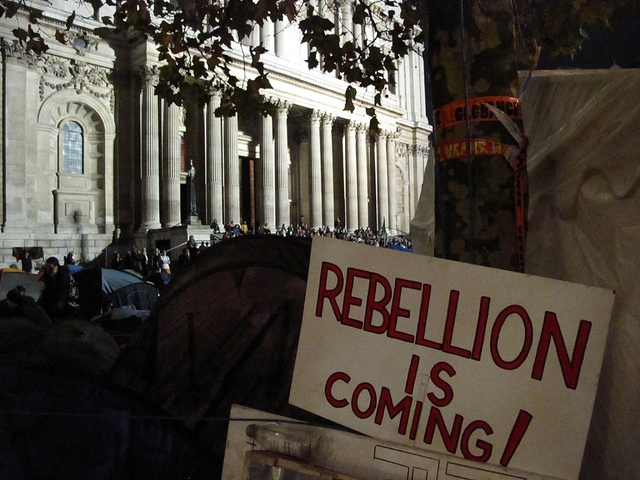Chris Hedges’ recent book is a passionate call for the “oppressed” of the Empire to revolt against the tyranny of surveillance, financial greed and propagandist journalism.
Oppression, tyranny, greed, propaganda — these are words that seem to come straight from a communist manifesto or anarchist pamphlet. But Hedges is neither the former nor the latter. Actually, in some of his previous writing, he referred to himself as a socialist.
His book, Wages of Rebellion, is a compilation of several stories about Americans, some of whom became household names: Mumia Abu-Jamal, the imprisoned Black revolutionary, Chelsea Manning, the imprisoned whistleblower, and other “normal” citizens like Avgi Tzenis, a survivor of Hurricane Sandy who saw her house badly damaged after the disaster and has since been living in poverty with no or little assistance from the U.S. government. All of these stories are handpicked with care and purpose, and make up the portrait of a new socially, financially and ethically unfair America formed over the last few decades.
Hedges’ main thesis is that as a society, we have reached the point of no return when a tiny group of political and financial interests is controlling the majority and “blindly serving their masters.” Meanwhile, the majority is kept under control with massive surveillance programs, through mass incarceration, without health care, and with a high rate of unemployment, rising level of debt and scrambling infrastructure. According to Hedges, only a peaceful revolution can change the tide and reestablish equality and peace.
Hedges is not a prophet. He doesn’t know when, how, or when this crawling revolution will happen, but he firmly believes that it will happen as it did in other countries and eras.
For this, Hedges brings in some historical examples: from the 1905 Argentine Revolution, the 1908 Young Turk Revolution, the 1911 Chinese Xinhai Revolution, to current ones like Occupy Wall Street and the Arab Spring. They were all unexpected, with a misleading facade of powerful governments but with decreasing government popularity and a strong desire for change.
But the type of revolution Hedges is calling for sometimes remains a bit vague for readers. Even though Hedges calls for a peaceful revolution, the line between peaceful resistance and armed struggle is sometimes blurred. Were there really peaceful revolutions with no blood and victims? Perhaps the “Velvet Revolution” in Czechoslovakia? How about the Arab Spring that started peacefully and turned into bloody repression? How about the French Revolution? The Bolsheviks’?
Hedges quotes the work of Maria J. Stephan and Erica Chenoweth, Why Civil Resistance Works: The Strategic Logic of Nonviolent Conflict. In 2008, the authors studied 100 years of violent and nonviolent resistance movements and found that nonviolent movements succeed twice as often as violent uprisings.
Hedges mentions the case of Edward Snowden and even goes on to visit Julian Assange in his forced imprisonment in the Ecuadorian embassy in the U.K. The fact that these two figures have been demonized in the West’s mainstream media seems to be indication for Hedges that they are rebellious figures fighting the hegemony of a media more and more aligned with the interests of political and financial elites.
The motives of Snowden and Manning may appear useless or self-destructive since one is in exile in Russia and the other has been in prison since he leaked sensitive files that the U.S. government never wanted the public to see. It is interesting to note that Snowden’s sacrifice, for one, didn’t go in vain: the new U.S. surveillance legislation, the USA Freedom Act, has been rewritten mainly as an answer to what Snowden disclosed to the public.
A crucial point of this new legislation is that it limited National Security Agency activities that were exposed by Snowden, and forced the government to stop its obvious spying on its citizens’ electronic communications.
The new legislation is not perfect. Instead of accessing the phone records of citizens directly, information is now stored in the hands of phone companies and the state will need a warrant to access them. In other words, the spying will continue, it is just the methods and scope that will change; but it is important to note that Snowden’s “peaceful act of rebellion” didn’t go in vain.
Civil liberties and privacy rights will always be fragile, and will always be in need of more activism, vigilance and acts of courage, but this small setback to the surveillance apparatus should be recognized and emphasized.
Last October, Chris Hedges was ordained a Presbyterian minister. After reading his book, I have no doubt that his faith played a tremendous role in shaping his ideas. In Wages of Rebellion, he declares: “There is nothing rational about rebellion. To rebel against insurmountable odds is an act of faith, without which the rebel is doomed.”
As a person of faith myself, I can’t say it better than this!
Monia Mazigh was born and raised in Tunisia and immigrated to Canada in 1991. Mazigh was catapulted onto the public stage in 2002 when her husband, Maher Arar, was deported to Syria where he was tortured and held without charge for over a year. She campaigned tirelessly for his release. Mazigh holds a PhD in finance from McGill University. In 2008, she published a memoir, Hope and Despair, about her pursuit of justice, and recently, a novel about Muslim women, Mirrors and Mirages. You can follow her on Twitter @MoniaMazigh or on her blog www.moniamazigh.com
Photo: duncan c/flickr



